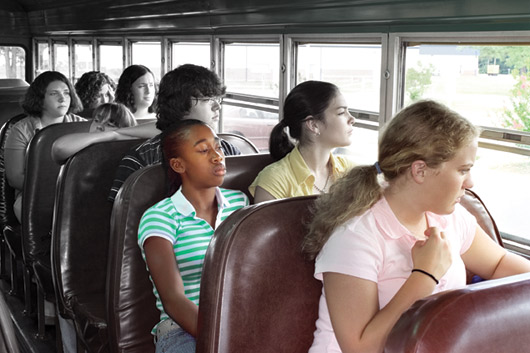Michigan Legal Milestones
36. Milliken v. Bradley—Desegregation, Busing, and Boundaries

Milliken v. Bradley, a historic 1974 United States Supreme Court case that addressed a plan for desegregation of schools and busing in Detroit and its suburbs, is the subject of the State Bar's 36th Michigan Legal Milestone.
Michigan Bar Journal
Resources
Complete Text on Milestone Marker
Milliken v. Bradley—Desegregation, Busing, and Boundaries
School desegregation became the law of the land after the United States Supreme Court's 1954 decision in Brown v. Board of Education. Twenty years later, the Supreme Court issued another landmark decision in a Detroit-based busing case, Milliken v. Bradley, which greatly impacted the city's population and changed the course of school desegregation in the United States.
In 1970, the Michigan legislature approved a bill to decentralize the Detroit school system. The National Association for the Advancement of Colored People, alleging public officials had intentionally segregated the Detroit schools, filed a lawsuit to overturn the statute on behalf of Richard and Ronald Bradley.
Federal District Judge Stephen Roth ruled integration was not possible within the city's boundaries and ordered a new plan to include 53 of the 85 surrounding, mostly white, school districts. This metropolitan plan set off a series of tense protests, but the United States Court of Appeals for the Sixth Circuit upheld Roth's ruling.
The United States Supreme Court heard the case in 1974. In a controversial 5-4 vote, it overturned the lower courts and ruled that federal courts, "could not impose a multidistrict, area-wide remedy upon local districts in the absence of any evidence those districts committed acts causing racial discrimination." The judgment recognized the tradition of local control over schools and found the remedy approved by lower courts could alter the structure of public education in Michigan. The decision was a setback for forced desegregation, and it limited the scope of Brown that declared state laws establishing separate public schools for black and white students unconstitutional.
The Supreme Court ruling helped hasten Detroit's racial divide. By the mid 1970s, Detroit schools had lost more than 51,000 white students. After the 2000 U.S. Census, the Detroit area received the dubious distinction of becoming "America's Most Segregated City."
Placed by the State Bar of Michigan and the Wolverine Bar Association, September 16, 2011.